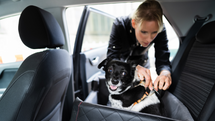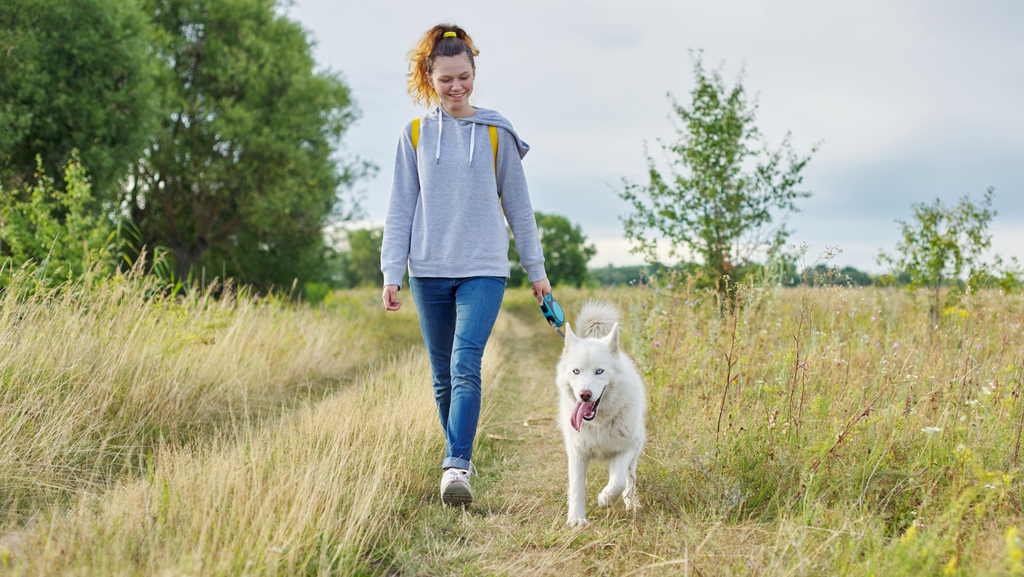Do Dogs Get Bored? And How-To Keep Your Dog Busy

You’re not alone if you’ve ever wondered, “Is my dog bored?” Many dog owners miss their dog’s hint that their dog needs more mental stimulation and attention. The answer to “Do dogs get bored?” is a resounding “YES!” Dogs are intelligent creatures that need mental stimulation and engagement to stave off boredom.
If you suspect your dog has been trying to tell you they are suffering from boredom, this article is here to help. We will cover the signs of dog boredom, how boredom can affect your dog’s health and wellbeing, and give you some tips to keep your canine companion’s ears perked and tail wagging.
Why Do Dogs Get Bored?
All it takes is a glance at the hardwiring of a dog to understand why many dogs get bored. The short explanation is your dog’s domesticated life is very different from the life they would have had just a few short centuries ago.
If that brief explanation didn’t do it for you, here’s the full answer.
Dogs Genetically Need Tasks & Attention
Dogs are naturally social creatures. This is the result of their genetics. First, dogs frequently have what’s often referred to as “William’s syndrome” [1]. William’s syndrome, or “I love you so, so, so much!” syndrome, is the result of two genes that make dogs exceptionally friendly. Most scientists suspect years of selective breeding led to today’s dogs being outgoing and extremely social. In other words, your dog’s genes make your dog need to play and interact with you and other humans.
In addition to having a naturally social disposition, dogs also have a natural and long-bred behavioural genetic inclination to collaborate, work, and hunt.
Socialization Was Passed Down from Wolves
If you were to observe a pack of dogs in the wild, you would notice that they constantly interact, communicate, and care for one another. This sociability comes from their wolf ancestors, to which your dog’s DNA is almost identical. Wolves in the wild use play and interaction to educate their pups and to pass on hunting techniques over generations [2]. In fact, wolves will remain playful long into old age.
Dogs Learned to Work Alongside People
Whether these traits are the reason why people domesticated wolves or not will remain a mystery. But, we do know that as wolves transformed into domesticated dogs, they adapted their skills and instincts to perform jobs and tasks. This made capable, energetic, and intelligent dogs invaluable to hunters, shepherds, and farmers. This is why your dog is remarkably smart and feels compelled to stay active and busy.
Your dog’s inborn prey drive and social nature make them need and want mental stimulation and interaction throughout the day. Additionally, centuries of breeding dogs to work have left most of our companions with the need to stay active.
How Does Boredom Affect Your Dog?
While being bored may seem inconsequential, chronic boredom can have negative effects on your dog’s physical and mental health.
Boredom can result in:
- Destructive behaviour
- Injury as a result of destructive actions
- Compulsive nail chewing [3]
- Excessive scratching
- Compulsive tail chasing
- Stress and anxiety [4]
- Depression [5]
- Lack of appetite
All of these effects lower your dog’s quality of life.
How Do You Know If Your Dog Is Bored?
Your dog may not be able to tell you directly when they’re feeling bored, but your dog will show signs that they need more mental and physical stimulation. While not all dogs exhibit identical signs of boredom, most show common behaviours that signal that it’s time to increase your dog’s mental activity.
The Most Common Dog Behaviors That Signal Boredom
Excessive Grooming or Licking
If you notice your dog constantly licking their paws or backend, your dog may be telling you that they have too much energy. If your dog licks non-stop this is also an indication that your dog may be bored.
Destructive Behaviour
If a dog doesn’t get enough activity, they often find an outlet for their energy. This can include chewing on inappropriate items like shoes and other household items. So, if you come home to a pile of shredded paper or pillows, there’s a good chance your dog is expressing their need for more mental stimulation.
Pacing or Tail Chasing
Have you ever been waiting without anything to do and found yourself pacing? Dogs also do this behaviour. Pacing, restlessly changing positions, and tail-chasing are ways for your dog to release extra energy.
Barking
A bored dog will engage in any outlet for potential excitement. This includes barking at passersby, the mail carrier, or a cat down the road. Some dogs will even try to bark their owners into action.
How To Stop Dog Boredom

It’s easy to get complacent as a dog owner. We get busy, stuck in our routines, and tend to run out of ways to keep our dogs busy. But boredom isn’t just the result of dog owners, dogs also naturally lose interest in activities and toys that once held their interest.
If you have a bored dog, don’t despair. There are plenty of ways to keep your dog busy, mentally stimulated, and enjoying life to its fullest.
Tip #1: Use Treats to Engage Your Dog’s Nose and Mind
Training treats can reignite your dog’s desire to hunt using their nose. All you have to do is hide these tiny morsels throughout the house and let your dog sniff them out. You can even make the game more fun with high value treats cut into tiny bites.
Tip for dogs on a diet: Use boiled carrot bites or another healthy veggie instead of treats.
Tip #2: Integrate New Toys and Rotate Toys
Like kids, dogs tend to get tired of the same toys day after day. One of the easiest ways to break your dog’s boredom is by investing in some new, interactive pet toys. These can make playtime more exciting, especially if you offer your dog a greater variety of toy types. For solo play, try treat puzzle toys.
You can even take some away and rotate them back into your dog’s toy bin every few weeks.
Is your dog a heavy chewer? Durable dog toys are the best way to keep them occupied and happy.
Tip #3: Make Mealtime More Interactive
Puzzle toys don’t have to be filled with treats. You can transform your dog’s mealtime into playtime with a treat ball or puzzle dog bowl.
Tip #4: Learn Some New Tricks and Practice Old Ones
Dogs that are highly motivated benefit from practising their tricks and learning new ones. Don’t hesitate to challenge your dog. Not only will your dog surprise you with their abilities, but your dog will gain a greater sense of pride.
Tip #5: Switch Up Your Walking Routine
If your dog’s walks have become a chore for both of you, your dog likely isn’t getting the most out of your outings. To keep your dog’s mind and senses more engaged on walks, try changing things up. Some easy alterations include:
- Choosing a new location or route
- Going a bit further on your normal walk
- Adding in an additional walk
- Switching your walk time
- Stopping en route to practice training skills
ip #6: Call in Other Canines
Setting up a doggy playdate or going to the dog park is an excellent way to help your dog relieve some energy, engage their social skills, and make some dog friends. This is a wonderful way to let your dog burn off energy without having to spend hours walking.
Tip #7: Sign Your Dog Up for Doggy Daycare
It can be tough to make time for all of your dog’s energy needs. Doggy daycare will change your dog’s life. Not only will your dog have plenty of attention from the daycare attendants, but they will also enjoy supervised interaction with other dogs.
Tip #8: Your Dog Is Never Too Old for Tug
We feel tug-of-war is one of the most underrated dog games. Playing old-fashioned tug offers your dog interactive play and keeps their muscles strong.
Tip #9: Add a Frosty Treat to Your Dog’s Day
Frozen treats (or what we like to call “pup-cicles”) will give your dog a sensational way to stay busy. All you have to do is fill a goat horn with peanut butter or your ice cube tray with some training treats then freeze them.
Tip #10: Give Your Dog Chewy Energy Release
Chewing relieves stress and releases happy endorphins for dogs. If your dog has a natural affinity to chewing, give in to their need to chew and clean their teeth while they’re at it. Antlers, goat horns and bully sticks are some of the best choices when it comes to intense chewers.
Don’t Let Your Dog Suffer from a Case of Boredom

If your dog tends to get bored, it’s easy to bust the boredom with some simple games, training, toys, and treats. Just keep in mind that your dog appreciates interaction and variety. When you prevent your pup’s boredom, you’re improving your dog’s physical and mental health while strengthening your bond.
Want to learn more about your dog’s needs? Check out our complete wellbeing guide for dogs.
[1] https://advances.sciencemag.org/content/3/7/e1700398
[2] https://www.livingwithwolves.org/about-wolves/social-wolf/
[3] https://pets.webmd.com/dogs/guide/dogs-and-compulsive-scratching-licking-and-chewing#1
[4] https://www.petmd.com/dog/behavior/evr_dg_how-to-calm-down-an-anxious-dog
[5] https://pets.webmd.com/dogs/features/depression-in-dogs#2





